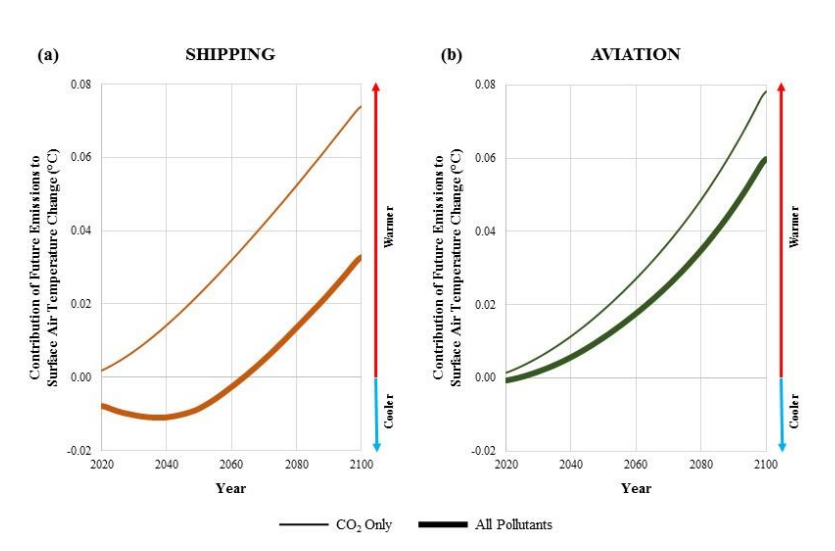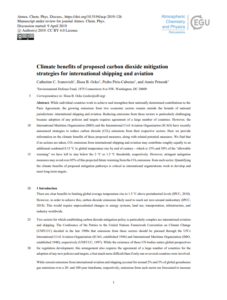A study called ‘Climate benefits of proposed carbon dioxide mitigation strategies for international shipping and aviation’ is focused on the role the emissions from international shipping and aviation play in the global climate, and what do those sectors need to do to help keep warming below 1.5 degrees Celsius.
Specifically, today many are the countries vowing to boost and follow in detail their Paris agreement commitments to help limit the increase in global temperatures to 1.5 degrees Celsius.
Yet, emissions coming from international shipping and aviation still cause major problems.

emissions starting in 2020 and continuing through the end of the century from international a) shipping and b) aviation. Future warming is assessed for emissions of CO2 only (thin line) and all pollutants (thick line).
In the study researchers found that absent any climate action, the rising carbon dioxide emissions of international shipping and aviation could consume nearly one-third (15 to 30%) of our remaining ‘allowable warming’ – the amount of additional warming that can occur before the world’s average temperature surpasses 1.5 to 2 degrees Celsius above preindustrial levels – by the end of the century.
Therefore, both sectors have to implement policy solutions to mitigate the emissions and reduce their future warming and align with the 1.5 °C global temperature threshold.
The researchers of the study noted that by 2018 the planet had already warmed 1 degree Celsius above preindustrial levels. This shows that there is an “allowable warming” of only 0.5 to 1.0 degree Celsius more if the Paris agreement thresholds of 1.5 or 2.0 degrees Celsius are to be met, respectively.
Unabated CO2 emissions from international shipping and aviation could add 0.15 degrees of warming to that limit by the end of the century – which is 15 to 30 percent of the remaining “allowable warming” under these thresholds.
What can we do?
The study highlights that there are already-proposed targets and policies within the international shipping and aviation in light of reducing projected warming from the sectors, should they be implemented with integrity.
For instance:
- Robust implementation of the Carbon Offsetting and Reduction Scheme for International Aviation (CORSIA), which caps the net CO2 emissions of most international flights at 2020 levels, could significantly reduce international aviation’s warming impact. The mitigation potential of the program is even greater if CORSIA’s targets are extended beyond 2035, and should the sector pursue further decarbonization by mid- or end-of-century the associated future warming from the CO2 emissions of international aviation may be reduced by roughly 90%.
- Robust implementation of the targets the International Maritime Organization announced in 2018, i.e., cutting international shipping CO2 emissions by at least 50% by 2050 compared to 2008 with full decarbonization by the end of the century, could reduce the warming impact associated with the CO2 emissions of international shipping by more than 85%.
However, the international shipping sector has considerably more work to do as the policies to achieve these targets do not yet exist.
Concluding, for more information on the study you may click here.


































































